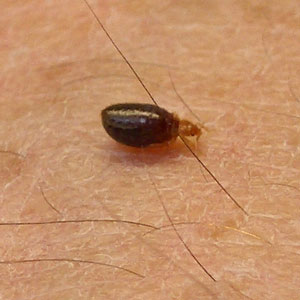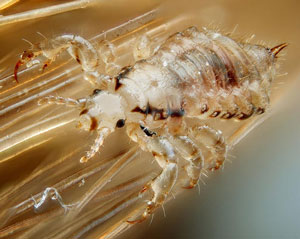Don’t Confuse Head Lice and Bed Bugs
By Chris Williams on August 12, 2013.

Bed bug
Photo credit: Armed Forces Pest Management Board / Foter / CC BY-NC-ND
Question
I’m trying to get my second grade daughter ready to go back to school. Unfortunately, in her classroom, all of the kids hang their backpacks and book bags up on pegs where they touch each other. I read that head lice like to hide in bags and packs so I’m worried about her bringing home head lice in her backpack. Is there any way I can treat the backpack to kill head lice?
Answer
First we need to make an important distinction because I think you are confusing head lice and bed bugs. Both of these insects suck blood from people and both can sometimes be found in schools, but they have very different habits. The main difference is that head lice prefer to remain on heads; they don’t wander. Bed bugs, on the other hand, are notorious for hitchhiking from infested sites to new sites on tote bags, suitcases, backpacks, purses, clothing, just about anything they can hide in.
Head lice stay on people
Head lice can be transmitted from one child to another in a classroom but they are transmitted mainly by direct head-to-head contact among children, and sometimes by sharing of hats, brushes, and other personal items. Unlike bed bugs, that leave their host after feeding, head lice remain on the head at all times, clinging to hairs. They attach their eggs to head hair and their young develop right on the same head. In fact, head lice do not survive long when off of a head.
Bed bugs don’t stay on people
Bed bugs usually infest new locations by accidentally being transported there on objects or people. If a child’s home has a serious bed bug infestation, bed bugs could be carried to the classroom on the child’s belongings. Bed bugs wander and could move from one backpack to another and be carried to a new home. This is one reason why schools are working towards having separate lockers or storage bins for each child’s belongings and school supplies.
Treatments for Head Lice and Bed Bugs Are Different

Head lice
Photo credit: Gilles San Martin / Foter / CC BY-SA
These two human parasites are controlled in different ways. In the case of head lice that are only found on heads, it does no good to spray insecticides in homes or classrooms (or backpacks!). The head lice would never come in contact with the insecticide spray. Head lice are killed by treating the infested head with special shampoos, intensive combing with a special comb, and washing of bedding and other personal items.
Bed bugs in homes usually require insecticide treatment of the bedroom or other areas where they have been found because bed bugs don’t stay on people. They spend the day hiding in cracks and crevices, coming out at night to locate and feed on their victims. Schools rarely require insecticide treatment for bed bugs. Schools may have occasional bed bug sightings, but they don’t have actual bed bug infestations since there are no people present at night for bed bugs to feed on. A breeding population never develops. Don’t spray your daughter’s backpack for bed bugs either. The chances that a bed bug might end up in her classroom, and then find its way into her pack are remote and you would just be exposing her to pesticide unnecessarily.
When bed bugs are found in a school, staff usually institutes a response program that incorporates inspection, nonchemical treatments, and prevention measures that include tracking down the source of the introduction. Rest assured that the teachers and staff at your daughter’s school have been well trained in recognizing and dealing with both head lice and bed bug outbreaks.